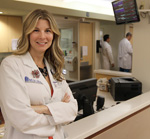|
by Dawn
Brazell
Public Relations
Back out on the links, Hilton Head
resident Barry W. Ginn ignores the
pain in his left arm bearing his
badge of honor, what he now calls
his 'work of art.'
Some may think
it a strange name for the scars
left behind from him having lost
an estimated nine pounds of flesh
and muscle from his arm in his
brush with death. Ginn's nightmare
started in February when he
contracted the 'flesh-eating'
bacteria known in medical circles
as necrotizing fasciitis.
 Barry W. Ginn
enjoys being back out on the
golf course after a harrowing
bout with necrotizing fasciitis
that required six operations. To
watch a video, visit http://tinyurl.com/brzuo6q. Barry W. Ginn
enjoys being back out on the
golf course after a harrowing
bout with necrotizing fasciitis
that required six operations. To
watch a video, visit http://tinyurl.com/brzuo6q.
Gingerly
holding up his arm that still
gives him pain, Ginn doesn't think
calling his scarred arm a work of
art is strange at all. He's just
grateful to be here – to still
have an arm.
Instead he
focuses on the salty tang of the
air, the sun warming the grass,
the fact that he is able to swing
a club when his story could have
gone so differently.
Ginn is one of
several patients in South Carolina
and Georgia who recently made
headlines for having survived
necrotizing fasciitis. Ginn's case
began with a sore shoulder where
he thought he had reinjured a torn
rotator cuff. He visited his
doctor, but the site continued to
get worse. Trying to ignore the
pain and tenderness, Ginn thought
he just needed to tough it out.
One reason he's
eager to tell his story is he
wants others to avoid his
mistakes. "I didn't continue to
ask questions, and I wasn't honest
with myself or my doctors. You're
so sick you can't have a train of
thought. Instead of telling him
what I thought was wrong, I should
have just told him I was sick."
The area became
hot and very painful. Ginn, who
lives alone, became disoriented
and began falling down. He had
bruises down his back. By the time
he knew he was in serious trouble,
he was too confused to call for
help.
"My mind was
mush. I don't think anyone has any
concept of what this disease does
to you. All this time I was
getting progressively sicker, and
I was sweating profusely."
Fortunately a
friend stopped by to see him, took
one look at him and picked up the
phone to call 911. "He didn't even
ask me. That's a good friend."
Ginn said he
will forever be grateful for that
visit.
"I was skating
death and should have been dead by
the time I got there."
Ginn went to a
local hospital and on Feb. 24 was
transferred to MUSC, where trauma
surgeon Stephanie Montgomery,
M.D., took one look at him and
scheduled him for surgery.
Having few
recollections of that time, Ginn
said he hated his daughter had to
sign paperwork giving the doctors
permission to amputate his arm
should it become necessary. Other
painful decisions about cremation
and where to scatter his ashes
were made.
Montgomery said
they had to act quickly.
Dr.
Stephanie Montgomery was part of
Barry Ginn's treatment team.
"I took him
almost immediately to the OR. With
necrotizing fasciitis, the
infected tissue easily is pushed
away, almost as if it sloughs off,
and it's critical to get rid of
all the infection, which is why
these patients often have more
than one surgery."
To the
Rescue
Ginn was placed on multiple
medications to keep his blood
pressure up, as well as on a
ventilator as they waited for
powerful, broad spectrum
antibiotics to kick in. "With all
the necrotizing fasciitis
patients, you're just not sure,"
said Montgomery. "I was at his
bedside for most of the night,
watching his wounds. He was touch
and go for the first 24 to 48
hours. It can take a turn at a
moment's notice."
As it turned
out, Montgomery had to take him
back into the OR that same
evening.
"It's not like
you get it all the first time.
Within six hours, it had spread
some more. The infection can
spread while you're treating it."
MUSC has a team
of seven trauma surgeons,
board-certified in both general
surgery and critical care, who
Montgomery jokes all eat, breathe
and sleep emergency care. They all
love the field and work closely as
a team to treat patients. In
Ginn's case, the team had to
decide whether to keep his arm.
The infection involved the muscles
in his left shoulder as well and
an orthopedist was called in for a
consult.
"If you have to
make a decision between life or
limb, limb goes."
A consensus was
reached to try to keep his arm and
wait to see if the infection could
be contained without having to do
the amputation. "You don't want to
do a definitive operation like
that unless you have to," she
said. "You make a judgment call.
That's where experience comes in.
That's why MUSC is the best place
to have that done. We take care of
this frequently."
Two other
trauma surgeons, Stephen Fann,
M.D., and Stuart Leon, M.D., would
end up taking Ginn in for more
surgeries, and then plastic
surgeon Dennis Schimpf, M.D., took
skin grafts to be able to cover
the wound on his arm and shoulder.
Finally on
March 13, 19 days after coming to
MUSC and six trips to the OR, Ginn
was well enough to go home.
Ginn, who has become friends with
Montgomery, said he's so thankful
to have gotten the care he did. "I
had doctors who weren't afraid to
make hard decisions."
Back on Par
Ginn, who's undergoing physical
therapy, still is working through
the trauma of having had
necrotizing fasciitis. Though
there's no way people can avoid
getting what he had, they can seek
treatment sooner. His one regret
is that he ignored the persistent
pain in his shoulder.
The sooner the
treatment, the better patients
with necrotizing fasciitis fare.
Montgomery said there needs to be
more education in the medical
community about symptoms,
particularly given how often these
cases occur. MUSC generally gets
at least one case a month.
There are more
virulent bacteria because of the
overuse of antibiotics, so there
are more of the cases, she said.
"The more awareness that is
brought up, the more physicians
who don't deal with it on a
regular basis, will educate
themselves," she said, adding that
MUSC takes transfers from every
hospital in the region. "They
should know we're here 24 hours a
day, seven days a week to deal
with this. It just takes one phone
call – through Meduline. It's a
one call does it all. We have the
resources to deal with these
complicated cases."
The way media
portrays the disease isn't quite
accurate.
"It's not a
flesh eating bacteria or anything
like that. It's an infection that
has been allowed to get bad or
it's a very bad organism that
causes the infection and it tracks
along the fascial planes inside of
a patient's subcutaneous tissues.
It can happen not only on arms and
legs, but on your torso, your back
– anywhere. It can happen from any
sort of trauma, a scratch or a bug
bite."
Montgomery said
there are patients who are more
susceptible, such as diabetics or
those with low immune systems.
Normal, healthy
people also can get it, though,
because it can just be a 'bad'
organism, such as staph, strep,
MRSA or even multiorganisms in
one. Treated early it's not a
problem, however, often patients
will let the infection set in
because they don't realize how bad
it is or they seek help from a
physician who doesn't recognize it
for what it is.
Warning
Signs
- Trauma
surgeon Stephanie Montgomery
said it's pointless to worry
about getting necrotizing
fasciitis. "You have bacteria
all over your body right now
that can cause this. It's in
the environment. Take care of
yourself and wash your hands.
If you have a wound that gets
infected, go see somebody with
experience in handling it."
- Pay
attention to any wound that
becomes red, starts growing,
has blisters, changes colors,
has red streaks that track
away from the wound, is hot to
the touch or develops intense,
persistent pain.
"It's not as
unusual as you think, which is the
reason it's important to choose a
place that sees it often and knows
how to take care of it well. These
patients are extremely sick. Not
only do you need a prompt surgical
approach, but you also need a team
who can take care of the aftermath
of the operation."
The patients
are in septic shock, which means
their system is so overwhelmed by
the infection that they are in
danger of multi-system organ
failure. Montgomery said she's
thankful for a well-trained
nursing and ICU staff who know how
to do the follow-up care these
patients require.
"We have
wound-care specialists. We have a
team of wound nurses who are
amazing. They help the wound close
faster and be more aesthetically
pleasing. That's important for
these patients because sometimes
you have take off quite a bit of
the soft tissue to make sure the
patient lives."
One of the best
parts of her job is when a patient
as sick as Ginn comes in and is
able to leave. Montgomery said she
developed a good relationship with
the family and Ginn, whom she
didn't really get to know well
until he began to recover. "He was
feisty. However, I'm feisty, so
that worked for us. He's fun and
witty, and I'm glad he's still
with us."
Ginn, of course, agrees.
"There is life
after necrotizing fasciitis," he
said.
"Everything
that happened to me was so
bizarre, it was mind boggling. God
has given me a second chance and
the doctors have given me a life.
That's a miracle. They made me a
whole person. I can feel and touch
and see what a big miracle it is."
|



 Barry W. Ginn
enjoys being back out on the
golf course after a harrowing
bout with necrotizing fasciitis
that required six operations. To
watch a video, visit
Barry W. Ginn
enjoys being back out on the
golf course after a harrowing
bout with necrotizing fasciitis
that required six operations. To
watch a video, visit 